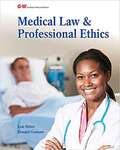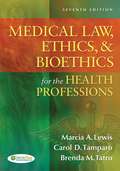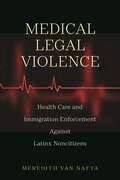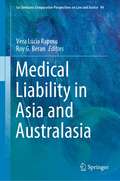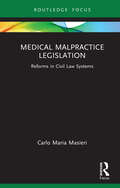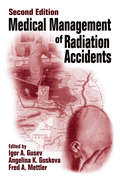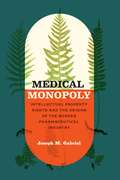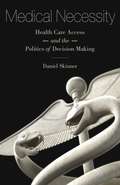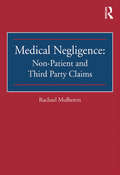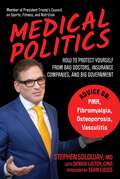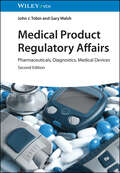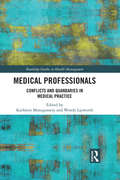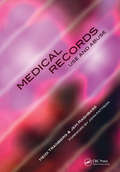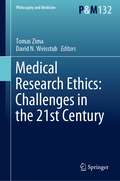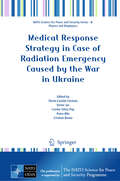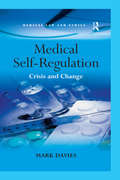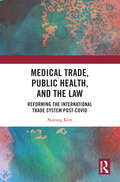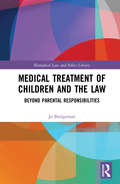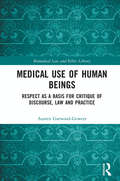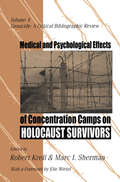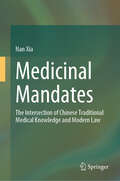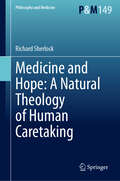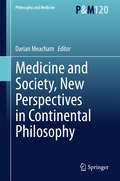- Table View
- List View
Medical Law and Medical Ethics
by Nils Hoppe José MiolaThis book advances a new approach, based on existing law, to constructing entitlements in human tissue and resolving resulting property conflicts. A new methodology is also put forward for abstracting different concepts within the debate which enables comparison and distinction between different cases of entitlement and retention.
Medical Law and Professional Ethics
by Donald Graham Lois RitterMedical Law and Professional Ethics focuses on the interrelationship of healthcare, law, and ethics and the application of legal and ethical principles to the healthcare field. This introductory text covers topics such as patient and healthcare-provider rights and related laws, legal issues related to health information technology, and medical-legal issues across the lifespan. In addition, situations and dilemmas that arise when professional roles and personal ethics collide are explored. Special features include case studies, court cases, and “what-if?” ethical scenarios that promote critical thinking and foster class discussion. An engaging career-focus feature introduces students to a broad range of professions in which medical law and professional ethics intersect. <P><P>Chapter-review material includes a variety of questions and activities to reinforce comprehension of key concepts covered in the text. Logically organized chapter content, straightforward writing, and dynamic visual aids promote and reinforce student understanding. Ethical scenarios go beyond familiar, high-profile cases by addressing situations and dilemmas more common in everyday life. Rather than focusing on how to avoid litigation, the use of law and ethics to improve healthcare systems and the delivery of care is emphasized and encouraged.
Medical Law, Ethics, and Bioethics for the Health Professions (Seventh Edition)
by Marcia A. Lewis Carol D. Tamparo Brenda M. TatroNow in its Seventh Edition, this groundbreaking book continues to champion the "Have a Care" approach, while also providing readers with a strong ethical and legal foundation that enables them to better serve their clients. The book addresses all major issues facing healthcare professionals today, including legal concerns, important ethical issues, and the emerging area of bioethics.
Medical Legal Violence: Health Care and Immigration Enforcement Against Latinx Noncitizens (Latina/o Sociology #16)
by Meredith Van NattaAn urgent study on how punitive immigration policies undermine the health of Latinx immigrantsOf the approximately 20 million noncitizens currently living in the United States, nearly half are “undocumented,” which means they are excluded from many public benefits, including health care coverage. Additionally, many authorized immigrants are barred from certain public benefits, including health benefits, for their first five years in the United States. These exclusions often lead many immigrants, particularly those who are Latinx, to avoid seeking health care out of fear of deportation, detention, and other immigration enforcement consequences. Medical Legal Violence tells the stories of some of these immigrants and how anti-immigrant politics in the United States increasingly undermine health care for Latinx noncitizens in ways that deepen health inequalities while upholding economic exploitation and white supremacy.Meredith Van Natta provides a first-hand account of how such immigrants made life and death decisions with their doctors and other clinic workers before and after the 2016 election. Drawing from rich ethnographic observations and in-depth interviews in three states during the Trump presidency, Van Natta demonstrates how anti-immigrant laws are changing the way Latinx immigrants and their doctors weigh illness and injury against patients’ personal and family security. The book also evaluates the role of safety-net health care workers who have helped noncitizen patients navigate this unstable political landscape despite perceiving a rise in anti-immigrant surveillance in the health care spaces where they work. As anti-immigrant rhetoric intensifies, Medical Legal Violence sheds light on the real consequences of anti-immigrant laws on the health of Latinx noncitizens, and how these laws create a predictable humanitarian disaster in immigrant communities throughout the country and beyond its borders. Van Natta asks how things might be different if we begin to learn from this history rather than continuously repeat it.
Medical Legal Violence: Health Care and Immigration Enforcement Against Latinx Noncitizens (Latina/o Sociology #16)
by Meredith Van NattaChoice Outstanding Academic Title 2023An urgent study on how punitive immigration policies undermine the health of Latinx immigrantsOf the approximately 20 million noncitizens currently living in the United States, nearly half are “undocumented,” which means they are excluded from many public benefits, including health care coverage. Additionally, many authorized immigrants are barred from certain public benefits, including health benefits, for their first five years in the United States. These exclusions often lead many immigrants, particularly those who are Latinx, to avoid seeking health care out of fear of deportation, detention, and other immigration enforcement consequences. Medical Legal Violence tells the stories of some of these immigrants and how anti-immigrant politics in the United States increasingly undermine health care for Latinx noncitizens in ways that deepen health inequalities while upholding economic exploitation and white supremacy.Meredith Van Natta provides a first-hand account of how such immigrants made life and death decisions with their doctors and other clinic workers before and after the 2016 election. Drawing from rich ethnographic observations and in-depth interviews in three states during the Trump presidency, Van Natta demonstrates how anti-immigrant laws are changing the way Latinx immigrants and their doctors weigh illness and injury against patients’ personal and family security. The book also evaluates the role of safety-net health care workers who have helped noncitizen patients navigate this unstable political landscape despite perceiving a rise in anti-immigrant surveillance in the health care spaces where they work. As anti-immigrant rhetoric intensifies, Medical Legal Violence sheds light on the real consequences of anti-immigrant laws on the health of Latinx noncitizens, and how these laws create a predictable humanitarian disaster in immigrant communities throughout the country and beyond its borders. Van Natta asks how things might be different if we begin to learn from this history rather than continuously repeat it.
Medical Liability in Asia and Australasia (Ius Gentium: Comparative Perspectives on Law and Justice #94)
by Vera Lúcia Raposo Roy G. BeranThis book brings together some of the most respected Asian and Australasian experts on medical liability to provide insightful perspectives on civil and criminal law from selected Australasian jurisdictions. It focuses on the idiosyncrasies of the existing law and case law in this part of the world with regard to medical liability, adopting a comparative and critical perspective. The aim is to provide an overview of the basic elements of medical liability in Asian and Australian jurisdictions, as well as the latest developments and general trends in jurisprudence.Given the broad range of jurisdictions covered, the book offers lawmakers, health administrators and practitioners, both in law and medicine, an alternative approach to the delivery of health care. Further, it is essential reading for all those (academics, lawyers, judges, researchers, practicing doctors and those involved in the growing area of legal medicine) working in medical liability, specially in the Australasian context.
Medical Malpractice Legislation: Reforms in Civil Law Systems (Young Feltrinelli Prize in the Moral Sciences)
by Carlo Maria MasieriThis book aims to analyse the legal tools that the legislatures of France, Germany and Italy adopted in order to regulate medical malpractice.In the mid-1970s, a reform movement started in the United States, where there was considerable concern about then ongoing medical malpractice crises. Since the beginning of the current century, France, Germany and Italy have passed statutes that aim to reform medical liability rules. Thus, it is first interesting to assess whether any medical malpractice crises have been identified in these systems and, second, how these have been faced through the passing of new statutes on the continent. Accordingly, the first chapter explores the idea of medical malpractice crisis and its relationship with the insurance market, also considering the reflections of American scholars. It then reconstructs the French, German and Italian legal frameworks, as well as their insurance and litigation contexts, reviewing and commenting on the quantitative evidence that was collected before the reforms. The second chapter briefly summarises the debate on medical malpractice reforms in France, Germany and Italy. It then analyses the statutes that have been passed, distinguishing between reforms that consolidate case law and reforms that introduce innovative solutions, sometimes repealing court-developed doctrines. In particular, the chapter examines in a comparative perspective the diff erent options adopted in these civil law countries with regard to the rules on liability, burden of proof, statute of limitations and damages. Moreover, the chapter examines the reforms of insurance, procedural and evidence law, to the extent they affect medical malpractice cases. The third chapter reviews and analyses the current available data related to medical malpractice litigation and insurance after the reforms adopted in France, Germany and Italy, in order to find out evidence of their effectiveness and efficiency. It also highlights some aspects of medical malpractice law that still belong to the domain of the judiciary. It finally points out which problems may be addressed by the legislatures and what further data should be collected in the future.This work may interest legal scholars, healthcare providers, insurers and policymakers.
Medical Management of Radiation Accidents
by Kenneth S. CohenAlthough radiation accidents are rare and often complex in nature, they are of great concern not only to the patient and involved medical staff, but to the media and public as well. Yet there are few if any comprehensive publications on the medical management of radiation accidents. Medical Management of Radiation Accidents provides a complete refe
Medical Monopoly: Intellectual Property Rights and the Origins of the Modern Pharmaceutical Industry
by Joseph M. GabrielDuring much of the nineteenth century, physicians and pharmacists alike considered medical patenting and the use of trademarks by drug manufacturers unethical forms of monopoly; physicians who prescribed patented drugs could be, and were, ostracized from the medical community. In the decades following the Civil War, however, complex changes in patent and trademark law intersected with the changing sensibilities of both physicians and pharmacists to make intellectual property rights in drug manufacturing scientifically and ethically legitimate. By World War I, patented and trademarked drugs had become essential to the practice of good medicine, aiding in the rise of the American pharmaceutical industry and forever altering the course of medicine. Drawing on a wealth of previously unused archival material, Medical Monopoly combines legal, medical, and business history to offer a sweeping new interpretation of the origins of the complex and often troubling relationship between the pharmaceutical industry and medical practice today. Joseph M. Gabriel provides the first detailed history of patent and trademark law as it relates to the nineteenth-century pharmaceutical industry as well as a unique interpretation of medical ethics, therapeutic reform, and the efforts to regulate the market in pharmaceuticals before World War I. His book will be of interest not only to historians of medicine and science and intellectual property scholars but also to anyone following contemporary debates about the pharmaceutical industry, the patenting of scientific discoveries, and the role of advertising in the marketplace.
Medical Necessity: Health Care Access and the Politics of Decision Making
by Daniel SkinnerHow the politics of &“medical necessity&” complicates American health care The definition of medical necessity has morphed over the years, from a singular physician&’s determination to a complex and dynamic political contest involving patients, medical companies, insurance companies, and government agencies. In this book, Daniel Skinner constructs a comprehensive understanding of the politics of defining this concept, arguing that sustained political engagement with medical necessity is essential to developing a health care system that meets basic public health objectives.From medical marijuana to mental health to reproductive politics, the concept of medical necessity underscores many of the most divisive and contentious debates in American health care. Skinner&’s close reading of medical necessity&’s production illuminates the divides between perceptions of medical need as well as how the gatekeeper concept of medical necessity tends to frame medical objectives. He questions the wisdom of continuing to use medical necessity when thinking critically about vexing health care challenges, exploring the possibility that contracts, rights, and technology may resolve the contentious politics of medical necessity.Skinner ultimately contends that a major shift is needed, one in which health care administrators, doctors, and patients admit that medical necessity is, at its base, a contestable political concept.
Medical Negligence: Non-patient And Third Party Claims
by Rachael MulheronHealthcare professionals face an increasing threat of litigation from parties whom they have never met in their daily medical practice and who look nothing like the traditional patient. The so-called ’non-patient’ may take many forms”for example, a person who is injured or killed by a mentally-ill, physically-disabled or diseased patient; a wrongfully-accused parent in a child neglect/abuse case; or a local authority which is put to the expense of caring for a negligently-treated patient. This book explores the legal principles and conundrums which arise when determining a healthcare professional’s liability in negligence towards a wide variety of non-patients. The topic is assuming increasing legal importance and relevance, given the potential for many non-patient claims to give rise to class actions litigation, and in light of the legislative and human rights interventions, and the frequent appellate judicial consideration, which non-patient claims have attracted in recent times. The aim of the book is to have utility for both legal and medical professionals; for academics and students of comparative medical negligence and tort law; and for law reformers who may be interested in adopting certain features of statutory models elsewhere which pertain to some non-patient claims, such as those based upon ’Good Samaritan’ conduct. Important parallels or counterpoints from other common law jurisdictions, in which courts and commentators have grappled with the legal complexities of non-patient claims, are also discussed and critically analyzed.
Medical Politics: How to Protect Yourself from Bad Doctors, Insurance Companies, and Big Government
by Stephen SolowayOne of America&’s top doctors rips the Band-Aid off to expose the American health care system Legislation written by drug and insurance companies, malpractice by corrupt and incompetent doctors, misguided and dishonest medical policy—the reality may be worse than you feared, and Medical Politics exposes all the secrets of a dirty American health care industry. Written by Stephen Soloway, one of America&’s top rheumatologists and a former appointee to Donald Trump&’s President's Council on Sports, Fitness, and Nutrition, this expose provides an inside look at how medical decisions are lobbied and money influences policy at the highest levels, explains how recent and upcoming medical policies will affect common Americans, and gives recommendations for a better American medical system. Featuring the author's personal letters to dirty insurance companies and other figures in the industry, Medical Politics takes readers inside Dr. Soloway's fight against Big Pharma and Big Insurance in search of better care for his patients. The result is shocking indictment of the American medical system from an insider--and charts a path for Americans to better advocate for themselves.
Medical Product Regulatory Affairs: Pharmaceuticals, Diagnostics, Medical Devices
by Gary Walsh John J. TobinMedical Product Regulatory Affairs Hands-on guide through the jungle of medical regulatory affairs for every professional involved in bringing new products to market Based on a module prepared by the authors for an MSc course offered by the University of Limerick, Ireland, Medical Product Regulatory Affairs is a comprehensive and practical guide on how pharmaceutical and medical devices are regulated within the major global markets. The Second Edition builds on the success of the first with an even wider scope and full coverage of new EU regulations on the safe use of medical devices. Following a look at drug development, complete sections are devoted to national and EU regulatory issues, manufacturing license application and retention, and regulation in the USA. Other topics dealt with include CDER, CBER and marketing and manufacturing licenses, the ICH process and Good Laboratory/Clinical/ Manufacturing Practices. Medical Product Regulatory Affairs includes information on: Aims and structure of regulation, covering purpose and principles of regulation, national and EU legislative processes, and pharmacopeia Regulatory strategy, covering product development and manufacturing, market vigilance, quality assurance systems, personnel, and documentation Drug discovery and development, covering prescription status, physical properties, therapeutic use, and drug discovery, development, and delivery Non-clinical studies, covering non-clinical study objectives and timing, pharmacological and pharmacodynamic studies, and bioavailability and bioequivalence Clinical trials, covering trial protocol, monitoring of trials, trial master files, and FDA communications The wide coverage of different product types and the main global markets makes Medical Product Regulatory Affairs ideal for training courses on regulatory affairs in academia and industry. It is also a valuable reference for pharmacologists, bioengineers, pharma engineers, and students in pharmacy to familiarize themselves with the topic.
Medical Professionals: Conflicts and Quandaries in Medical Practice (Routledge Studies in Health Management)
by Kathleen Montgomery Wendy LipworthMedical Professionals: Conflicts and Quandaries in Medical Practice offers a fresh approach to understanding the role-related conflicts and quandaries that pervade contemporary medical practice. While a focus on professional conflicts is not new in the literature, what is missing is a volume that delves into medical professionals’ own experience of the conflicts and quandaries they face, often as a result of inhabiting multiple roles. The volume explores the ways in which these conflicts and quandaries are exacerbated by broader societal forces, including changing scientific and technological paradigms, commercialization, and strengthened consumer movements, which simultaneously expand the scope of roles and responsibilities that medical professionals are expected to fulfill, and make it more difficult to do so. Several empirical chapters analyze data from qualitative interview studies with clinicians and other stakeholders. The studies highlight the burdens on clinicians who are expected to make informed and justified judgments and decisions in the midst of competing pressures; authors describe the methods that clinicians use to address the associated tensions within specific contexts. Two conceptual chapters follow and offer some innovative ways to think about the challenges facing medical professionals as they strive to make sense of the changing landscape within healthcare. The first reflects on the challenges to clinical practice in the midst of shifting and often competing definitions of disease and associated ideologies of care. The second reflects more broadly on the utility of value pluralism as a framework for conceptualizing and working through moral and professional quandaries. The book concludes with a chapter containing suggestions for how members of the medical profession might reframe their thinking about their roles, responsibilities, and decision-making in the midst of inevitable quandaries such as those presented here. This book will be of vital reading for academics, researchers, educators, postgraduate students, and interested health care practitioners and administrators.
Medical Records Use and Abuse
by Heidi Tranberg Jem Rashbass‘This book provides the background and practical guidance for all those of us who face challenges for the way we handle medical records. Written by a lawyer and a clinical informatician it provides the fusion between the legal issues and the practical clinical ones. There are clear explanations of the current legal framework, set in the context of real-world applications; the more complex issues that have a significant impact on Policy are also dealt with in depth. The background to ‘consent’ and the impact that implied and explicit consent can have on the way records are collect and used is particularly well covered. This book has many audiences, all of whom will gain from the easily accessible information within it. Caldicott guardians, research ethics committee members, and all those researchers and clinicians who need to analyze patient information will have a particular need for this handbook. Patients and the public should use it to understand how their healthcare information is protected and used. Its arrival could not have come at a better time’ Sir John Pattison, Former Director of Research, Analysis and Information, Department of Health, England.
Medical Research Ethics: Challenges in the 21st Century (Philosophy and Medicine #132)
by David N. Weisstub Tomas ZimaThis book provides a current review of Medical Research Ethics on a global basis. The book contains chapters that are historically and philosophically reflective and aimed to promote a discussion about controversial and foundational aspects in the field. An elaborate group of chapters concentrates on key areas of medical research where there are core ethical issues that arise both in theory and practice: genetics, neuroscience, surgery, palliative care, diagnostics, risk and prediction, security, pandemic threats, finances, technology, and public policy.This book is suitable for use from the most basic introductory courses to the highest levels of expertise in multidisciplinary contexts. The insights and research by this group of top scholars in the field of bioethics is an indispensable read for medical students in bioethics seminars and courses as well as for philosophy of bioethics classes in departments of philosophy, nursing faculties, law schools where bioethics is linked to medical law, experts in comparative law and public health, international human rights, and is equally useful for policy planning in pharmaceutical companies.
Medical Response Strategy in Case of Radiation Emergency Caused by the War in Ukraine (NATO Science for Peace and Security Series B: Physics and Biophysics)
by Florin-Catalin Cirstoiu Victor Juc Corina Silvia Pop Petre Min Cristian BarnaThis book addresses a potential radiation incident caused by the war in Ukraine, from an interdisciplinary approach of medical, nuclear safety and security, nuclear research, geostrategic and population’s resilience perspectives. The book also address the key role played by NATO in identifying new solutions for stabilizing the region, while also focusing on the emergency preparedness in order to ensure that adequate capabilities and capacity are in place which can be mobilized in response to a radiation emergency.Russia's military invasion in Ukraine is considered the most serious security crisis in Central and Eastern Europe since the end of the Cold War, with major implications for the regional security environment and NATO. Since the very beginning of Russia's illegal military invasion in Ukraine the Heads of State and Government of the member countries of the North Atlantic Alliance condemned the invasion and demand that Russia should stop and withdraw its forces from Ukraine, being deeply concerned that the violence and insecurity in the region caused by Russia are determining a critical humanitarian situation and material destruction all over Ukraine.Moreover, after invading Ukraine, Russian army took control of the Zaporizhzhia nuclear power plant, in early March, 2022. Since then, Russian military units guard the facility and, after Russian President Vladimir Putin annexed up to 18% of Ukraine, including the area where the nuclear plant is located, he signed a decree to formalize Russian control over the plant.
Medical Self-Regulation: Crisis and Change (Medical Law and Ethics)
by Mark DaviesSelf-regulation constitutes an important aspect of the regulatory and oversight process governing professionals. This book focuses directly on medical self-regulation in the context of both the wider regulatory framework and that of other regulatory models. Through a critical consideration of recent events, including high-profile and controversial cases, it is demonstrated that the self-regulatory process has failed and that only fundamental restructuring and a radical change in attitudes on the part of members of the profession can repair the damage. Attention is also given to the recent changes, current proposals for change and to alternative regulatory models. Medical Self-Regulation will be of international interest, appealing to policy makers, as well as students and practitioners in the fields of medicine, medical law and sociology and professional regulation.
Medical Trade, Public Health, and the Law: Reforming the International Trade System Post-Covid
by Nayung KimFaced with evolving trade and health dynamics, this book presents a historical, conceptual, and empirical examination of public health and medical procurement in international trade law at a time of emergency. The work argues that the current trade framework is outdated and must be redesigned to suit the new needs of the 21st century. It identifies critical problems within the current international trade system that prevents it from effectively responding to pandemics, as well as to the emerging digital economy. Based on the analysis, the study puts forward specific suggestions to upgrade the current trade rules framework to prepare for future international public health emergencies and further digitalization of health services. The book will be a valuable resource for academics, researchers and policy-makers working in the areas of International Trade Law, Public Health Law and Medical Law.
Medical Treatment of Children and the Law: Beyond Parental Responsibilities (Biomedical Law and Ethics Library)
by Jo BridgemanThe high profile cases of Charlie Gard, Alfie Evans, and Tafida Raqeeb raised the questions as to why the state intrudes into the exercise of parental responsibility concerning the medical treatment of children and why parents may not be permitted to decide what is in the best interests of their child. This book answers these questions. It argues for a reframing of the law concerned with the medical treatment of children to one which better protects the welfare of the individual child, within the context of family relationships recognising the duties which professionals have to care for the child and that the welfare of children is a matter of public interest, protected through the intervention of the state. This book undertakes a rigorous critical analysis of the case law concerned with the provision of medical treatment to children since the first reported cases over forty years ago. It argues that understanding of the cases only as disputes over the best interests of the child, and judicial resolution thereof, fails to recognise professional duties and public responsibilities for the welfare and protection of children that exist alongside parental responsibilities and which justify public, or state, intervention into family life and parental decision-making. Whilst the principles and approach of the court established in the early cases endure, the nature and balance of these responsibilities to children in their care need to be understood in the changing social, legal, and political context in which they are exercised and enforced by the court. The book will be a valuable resource for academics, students, and practitioners of Medical Law, Healthcare Law, Family Law, Social Work, Medicine, Nursing, and Bioethics.
Medical Use of Human Beings: Respect as a Basis for Critique of Discourse, Law and Practice (Biomedical Law and Ethics Library)
by Austen Garwood-GowersWhilst activities like transplantation and medical research have typically been considered on a discrete basis, they are also actually part of a broader phenomenon of medical means being employed to make use of human beings. This book is the first ever systematic critique of such medical use of the human being as a whole. It is divided into two parts. The first part considers what constitutes an appropriate normative lens through which to view such medical use and its constraint. It makes a reasoned ethical and human-rights-based case for preferring respect for human worth over any of the main alternative approaches that have been drawn on in specific contexts and outlines what this preference practically implies. The second part uses this respect-based lens to critique use discourse, law and practice. Drawing on three contrasting case study areas of warfare-related medical use, transplantation and human tissue research, this book exposes both the context-specific and thematic nature of shortfalls in respect. Overall this book provides a compelling analysis of how medical use ought to be constrained and a compelling critique of the excesses of discourse, practice and governance. It is recommended to academics, students, policymakers and professionals whose work is focused on or intersects with the medical sector and anyone else with an interest in medicine and its limits.
Medical and Psychological Effects of Concentration Camps on Holocaust Survivors: A Research Bibliography (Genocide Ser. #Vol. 4)
by Robert Krell & Marc I. ShermanThis unique research bibliography is offered in honor of Leo Eitinger of Oslo, Norway. Dr. Eitinger fled to Norway in 1939, at the start of the World War II. He was caught and deported to Auschwitz, where, among others, he operated on Elie Wiesel who has written the foreword to this volume. After the war, Eitinger became a pioneering researcher on a subject from which many shied away. His contributions to understanding of the experience of massive psychological trauma have inspired others to do similar work. His many books and papers are listed in this special volume of the acclaimed bibliographic series edited by Israel W. Charny of The Institute on the Holocaust and Genocide in Jerusalem.In order to acquaint users of this bibliography with the topic, two introductory articles are offered. The first is titled "Survivors and Their Families" and deals with the impact of the Holocaust on individuals. The second, "Psychiatry and the Holocaust," examines the general impact of the Holocaust on the field of psychiatry. Robert Krell writes that in general the psychiatric literature has reflected critically on the survivor due to preconceived notions held by many mental health professionals. For many years, the exploration of victims' psychopathology obscured the remarkable adaptation made by some survivors. The problems experienced by survivors and possible approaches to treatment were entirely absent from mainstream psychiatric textbooks such as the Comprehensive Textbook of Psychiatry throughout the 1960s and 1970s.Fifty years of observations about survivors of the concentration camps and other survivors of the Holocaust (in hiding, as partisans, in slave labor camps) has provided a new body of medical and psychiatric literature. This comprehensive bibliography contains a plethora of references to significant pieces of literature regarding the Holocaust and its effects on survivors. It will be of inestimable value to physicians, psychiatrists, psychologists, and social workers, along with historians, sociologists, and Holocaust studies specialists.
Medicinal Mandates: The Intersection of Chinese Traditional Medical Knowledge and Modern Law
by Nan XiaThis book provides an in-depth analysis of Traditional Medical Knowledge (TMK) in China, focusing on its preservation, responsible use, and integration into modern intellectual property (IP) frameworks. It explores the unique challenges of protecting TMK within China&’s historical, cultural, and societal contexts, while also considering alternative regulatory mechanisms like Access and Benefit-Sharing (ABS) regimes and TMK databases. Through case studies such as the commercialization of Qinghao, the book examines the role of TMK in pharmaceutical innovation and critiques the applicability of Western IP systems to Chinese TMK. It also discusses the need for culturally sensitive legal reforms, offering practical insights for scholars, policymakers, and practitioners interested in IP law, traditional medicine, and cultural preservation. This work is enriched with comparative legal analyses and detailed examples, providing a clear understanding of the complexities surrounding TMK in China and its impact on both cultural heritage and innovation.
Medicine and Hope: A Natural Theology of Human Caretaking (Philosophy and Medicine #149)
by Richard SherlockThis book expands, in a modest way, the discussion of hope and does so by focusing on a field where it is at the core of care-taking: medicine. The three great religious virtues of medieval theology were faith, hope, and love. An enormous literature exists about faith and love, but much less exists about hope. Doctors often know what they want to do for a patient but do not know whether they are able to have a good result. If they fail, will the result be worse? They must hope they can succeed. In other cases, they know what they can do but they are uncertain whether they should. If they do not undertake action, will the patient try to do it themselves with a much worse result? Questions such as these raise the issue of the importance of hope in medicine. This book builds on an insight from the first modern textbook of medical ethics, Thomas Percival’s 1803 classic Medical Ethics. There Percival says that the doctor is a “minister of hope to the sick”. This book analyses this concept, which is central to the practice of medicine.
Medicine and Society, New Perspectives in Continental Philosophy
by Darian MeachamThis volume addresses some of the most prominent questions in contemporary bioethics and philosophy of medicine: 'liberal' eugenics, enhancement, the normal and the pathological, the classification of mental illness, the relation between genetics, disease and the political sphere, the experience of illness and disability, and the sense of the subject of bioethical inquiry itself. All of these issues are addressed from a "continental" perspective, drawing on a rich tradition of inquiry into these questions in the fields of phenomenology, philosophical hermeneutics, French epistemology, critical theory and post-structuralism. At the same time, the contributions engage with the Anglo-American debate, resulting in a fruitful and constructive conversation that not only shows the depth and breadth of continental perspectives in bioethics and medicine, but also opens new avenues of discussion and exploration. For decades European philosophers have offered important insights into the relation between the practices of medicine, the concept of illness, and society more broadly understood. These interventions have generally striven to be both historically nuanced and accessible to non-experts. From Georges Canguilhem's seminal The Normal and the Pathological, Michel Foucault's lectures on madness, sexuality, and biopolitics, Hans Jonas's deeply thoughtful essays on the right to die, life extension, and ethics in a technological age, Hans-Georg Gadamer's lectures on The Enigma of Health, and more recently Jürgen Habermas's carefully nuanced interventions on the question of liberal eugenics, these thinkers have sought to engage the wider public as much as their fellow philosophers on questions of paramount importance to current bioethical and social-political debate. The essays contained here continue this tradition of engagement and accessibility. In the best practices of European philosophy, the contributions in this volume aim to engage with and stimulate a broad spectrum of readers, not just experts. In doing so the volume offers a showcase of the richness and rigor of continental perspectives on medicine and society.

